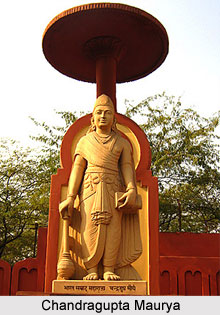 According to the historians, Chandragupta Maurya belonged to a Kshatriya origin and appeared in the political situation on the eve of Alexander`s invasion. Chandragupta did not have any dynastic connection, as is reported by most historians but he became the king acquiring sole authority over the entire north India through a series of conquests. In Indian history, Chandragupta is popularised as a great conqueror. However the historians after a prolonged study of the available records of the Mauryan period have surmised the conquests of Chandragupta Maurya into four phases: - war of liberation from the Greeks, political revolution against the Nandas, the war with Selucus and other fragmented conquests. There is a keen controversy among the scholars about the chronology of the war of liberation of northwestern India. The interpretation of Justin is the accepted authentic source in this respect. He puts that after raising an army, Chandragupta pleaded for the Indians to overthrow the existing government. The main point of debate lies in the term "existing government" because there is a difference among the modern interpreters that whether the term "existing government" refers to the Nandas or the Greeks. In spite of these controversies and differences, the modern historians have unanimously opined that by the term "existing government", Justin referred to the alien Greeks. According to the historians, Chandragupta had unified the
entire north India and became the sole master of the northern territory of India.
According to the historians, Chandragupta Maurya belonged to a Kshatriya origin and appeared in the political situation on the eve of Alexander`s invasion. Chandragupta did not have any dynastic connection, as is reported by most historians but he became the king acquiring sole authority over the entire north India through a series of conquests. In Indian history, Chandragupta is popularised as a great conqueror. However the historians after a prolonged study of the available records of the Mauryan period have surmised the conquests of Chandragupta Maurya into four phases: - war of liberation from the Greeks, political revolution against the Nandas, the war with Selucus and other fragmented conquests. There is a keen controversy among the scholars about the chronology of the war of liberation of northwestern India. The interpretation of Justin is the accepted authentic source in this respect. He puts that after raising an army, Chandragupta pleaded for the Indians to overthrow the existing government. The main point of debate lies in the term "existing government" because there is a difference among the modern interpreters that whether the term "existing government" refers to the Nandas or the Greeks. In spite of these controversies and differences, the modern historians have unanimously opined that by the term "existing government", Justin referred to the alien Greeks. According to the historians, Chandragupta had unified the
entire north India and became the sole master of the northern territory of India.






































